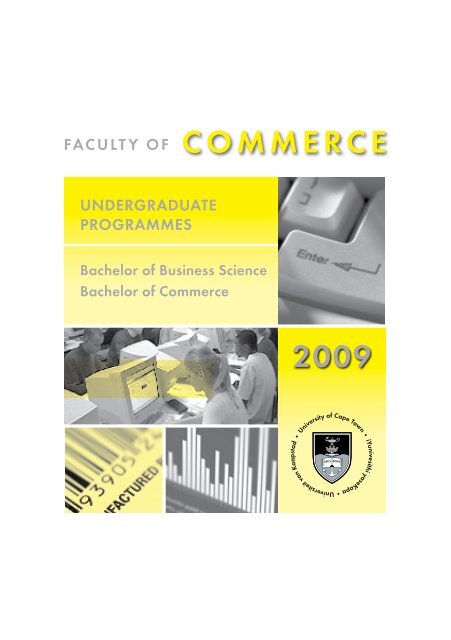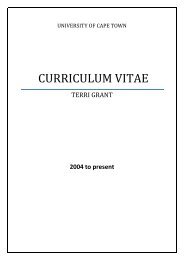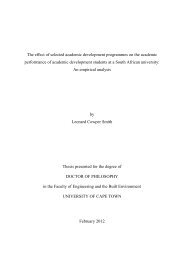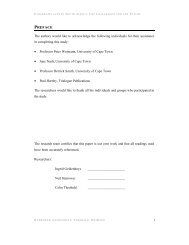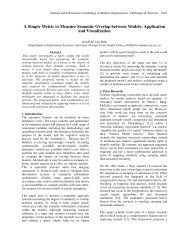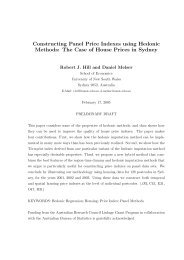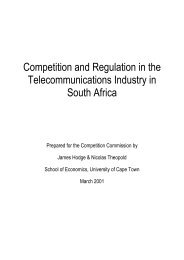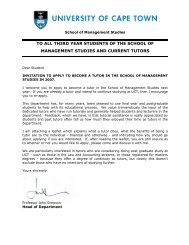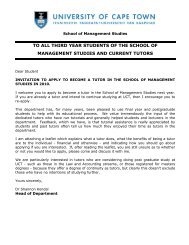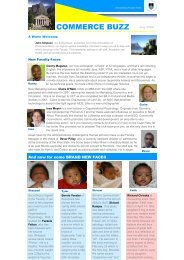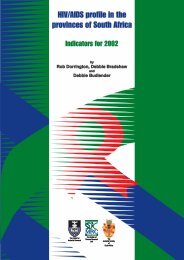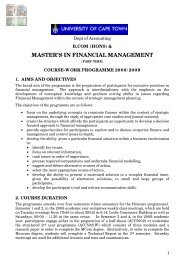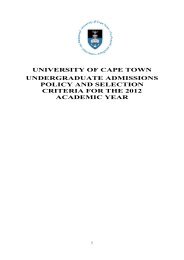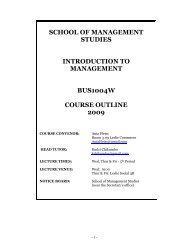COMMERCE 2009 - Faculty of Commerce - University of Cape Town
COMMERCE 2009 - Faculty of Commerce - University of Cape Town
COMMERCE 2009 - Faculty of Commerce - University of Cape Town
You also want an ePaper? Increase the reach of your titles
YUMPU automatically turns print PDFs into web optimized ePapers that Google loves.
FACULTY OF<br />
<strong>COMMERCE</strong><br />
UNDERGRADUATE<br />
PROGRAMMES<br />
Bachelor <strong>of</strong> Business Science<br />
Bachelor <strong>of</strong> <strong>Commerce</strong><br />
<strong>2009</strong>
1<br />
FACULTY OF <strong>COMMERCE</strong><br />
UNDERGRADUATE PROGRAMMES<br />
<strong>2009</strong><br />
Contents<br />
Message from the Dean 3<br />
Why <strong>Commerce</strong> 4<br />
Undergraduate degrees <strong>of</strong>fered 5<br />
Degree programmes at a glance 7<br />
Postgraduate study in <strong>Commerce</strong> 9<br />
Areas <strong>of</strong> specialisation: 10<br />
Accounting 11<br />
Actuarial Science 14<br />
Computer Science 16<br />
Economics 16<br />
Finance 20<br />
Information Systems 22<br />
Law 24<br />
Marketing 25<br />
Organisational Psychology 26<br />
Statistical Sciences 30<br />
CONTENTS<br />
(continued overleaf)<br />
Please note that every care has been taken to ensure that the contents<br />
<strong>of</strong> this booklet are accurate. However, in the event <strong>of</strong> any discrepancies,<br />
the <strong>Commerce</strong> <strong>Faculty</strong> Handbook will prevail.
2<br />
Details <strong>of</strong> programme syllabi 32<br />
Education Development Unit (EDU) <strong>Commerce</strong> 32<br />
AD BBusSc and AD BCom<br />
Bachelor <strong>of</strong> Business Science Standard Programmes 34<br />
CONTENTS<br />
ACTUARIAL SCIENCE PROGRAMME 34<br />
ACTUARIAL SCIENCE 34<br />
QUANTITATIVE FINANCE 35<br />
MANAGEMENT STUDIES PROGRAMME 36<br />
FINANCE 36<br />
FINANCE (CA OPTION) 37<br />
COMPUTER SCIENCE 38<br />
INFORMATION SYSTEMS 39<br />
ECONOMICS 39<br />
LAW 41<br />
MARKETING 42<br />
ORGANISATIONAL PSYCHOLOGY 43<br />
QUANTITATIVE MANAGEMENT 44<br />
Bachelor <strong>of</strong> <strong>Commerce</strong> Standard Programmes 45<br />
ACCOUNTING PROGRAMME 45<br />
GENERAL ACCOUNTANT STREAM 45<br />
CHARTERED ACCOUNTANT STREAM 46<br />
ACCOUNTING AND LAW STREAM 46<br />
INFORMATION SYSTEMS PROGRAMME 47<br />
ECONOMICS PROGRAMME 48<br />
PHILOSOPHY, POLITICS AND ECONOMICS (PPE) STREAM 48<br />
ECONOMICS AND FINANCE STREAM 49<br />
ECONOMICS AND STATISTICS STREAM 51<br />
ECONOMICS AND LAW STREAM 52<br />
Brief outline <strong>of</strong> first year courses 53<br />
Entrance Requirements <strong>2009</strong> 56<br />
Contact information 60
3<br />
A MESSAGE FROM THE DEAN<br />
With much enthusiasm, I present to you<br />
the undergraduate programme<br />
<strong>of</strong>ferings in the <strong>Faculty</strong> <strong>of</strong> <strong>Commerce</strong><br />
at UCT. As you will see from the<br />
contents <strong>of</strong> this booklet, we <strong>of</strong>fer a<br />
wide variety <strong>of</strong> programmes and<br />
streams designed to stimulate your<br />
thinking, unleash your potential and<br />
extend possibilities. While internationally<br />
competitive, our<br />
programmes retain local relevance and therefore equip you to contribute<br />
significantly to development challenges around us.<br />
At this important point in South Africa's history, it is encumbent on<br />
universities to produce enterprising graduates who are not only creative<br />
but possess technical skills. These and other desirable people-skills enable<br />
them to be constructive in whatever sphere <strong>of</strong> human endeavour they find<br />
themselves. Our graduates are proudly everywhere in South Africa, within<br />
the rest <strong>of</strong> the region and indeed worldwide. This is an exciting time for all<br />
<strong>of</strong> us and I encourage you to seize the day!<br />
MESSAGE FROM THE DEAN<br />
Pr<strong>of</strong>essor Melvin Ayogu<br />
Dean <strong>of</strong> <strong>Commerce</strong><br />
<strong>University</strong> <strong>of</strong> <strong>Cape</strong> <strong>Town</strong>
4<br />
WHY <strong>COMMERCE</strong><br />
WHY <strong>COMMERCE</strong><br />
Our degree content<br />
UCT’s academic excellence is grounded in solid academic theory<br />
combined with a high level <strong>of</strong> business and pr<strong>of</strong>essional contact to <strong>of</strong>fer a<br />
degree at the cutting edge. Not only will you learn what to do, we will<br />
also teach you why, when, where and how to do it, both now and in the<br />
future. A real education that provides life-long learning, not a quick-fix<br />
training solution. We are not just about numbers. Our graduates<br />
understand there is way more to life and business than technical<br />
pr<strong>of</strong>iciency and money. That is why our programmes require students to<br />
continuously engage in tasks that improve their critical thinking and<br />
communication skills. This provides them with the key tools to integrate their<br />
learning in all the subjects studied in the current and previous years.<br />
Student opportunities<br />
Our students are the lifeblood <strong>of</strong> our faculty. We place great emphasis on<br />
innovative teaching methods, <strong>of</strong>fer small group tutorials, high levels <strong>of</strong><br />
consultation with the academic staff and an excellent administrative<br />
service. In addition, UCT <strong>of</strong>fers a comprehensive range <strong>of</strong> student<br />
development services and personalised career planning throughout your<br />
degree. Students also have access to a wide variety <strong>of</strong> sporting, social,<br />
cultural, environmental and spiritual activities, and our graduates are<br />
members <strong>of</strong> a worldwide network <strong>of</strong> UCT alumni.<br />
Flexibility<br />
Our BCom and BBusSc degree programmes are tailored to meet<br />
international standards <strong>of</strong> excellence within an African context and are<br />
designed to give you maximum flexibility in your career. Offered as<br />
standard or extended programmes, both degrees provide our students with<br />
a solid foundation in business. If you meet our requirements for access to<br />
the extended BCom or BBusSc programmes, you will benefit from an extra<br />
year, giving you time to adapt to a different style <strong>of</strong> learning while still<br />
graduating with exactly the same renowned degree. Whether you want to<br />
work here or go abroad, change jobs or even careers, your <strong>Commerce</strong><br />
degree will give you the education that will enable you to succeed in a
5<br />
rapidly changing environment. Whilst in the early stages <strong>of</strong> your degree,<br />
you may also choose to move from one stream to another, and some<br />
students even change degrees.<br />
Our reputation<br />
UCT is proud <strong>of</strong> its international standing, and the <strong>Commerce</strong> <strong>Faculty</strong> is no<br />
different. The strong friendships we enjoy with many leading local and<br />
international firms are testament to our commitment to and longstanding<br />
tradition <strong>of</strong> providing a multitude <strong>of</strong> industries and pr<strong>of</strong>essions with<br />
graduates who are able to contribute to the organisation’s success as soon<br />
as they start work. Your UCT degree is highly regarded, and for good<br />
reason. Our contribution to research in various fields ensures that our staff<br />
members are internationally respected and enables many businesses to<br />
stay ahead <strong>of</strong> a constantly changing market, as can be witnessed by the<br />
many centres and institutes based at UCT that are supported by these<br />
organisations. This research is brought into the classroom to enhance<br />
learning and illustrate theory, further enriching your degree.<br />
UNDERGRADUATE DEGREES OFFERED<br />
• Bachelor <strong>of</strong> Business Science (BBusSc)<br />
• Bachelor <strong>of</strong> <strong>Commerce</strong> (BCom)<br />
Both degrees are divided into a variety <strong>of</strong> programmes to cater both for<br />
the interests <strong>of</strong> our students and the employment needs <strong>of</strong> the country. The<br />
first year in both degrees is more or less common, for two main reasons:<br />
• All commerce graduates should have a solid academic foundation in a<br />
range <strong>of</strong> “core” subject areas: Accounting, Information Systems,<br />
Economics, Business Law, Mathematics, Statistics and Evidence-Based<br />
Management<br />
• We do not expect students new to university to finalise their degree or<br />
programme choices before being exposed to the disciplines at a<br />
tertiary level, so the more similar the programmes, the more flexibility<br />
students have to move around as they discover where their strengths<br />
and interests lie.<br />
UNDERGRADUATE DEGREES OFFERED
6<br />
All students are required to have a minimum level <strong>of</strong> computer competence<br />
at the start <strong>of</strong> their studies, or they will be required to complete a course in<br />
computer literacy.<br />
UNDERGRADUATE DEGREES OFFERED<br />
The BBusSc focuses primarily on management, but also gives students the<br />
opportunity to specialise in an additional discipline that can be taken to<br />
the Honours level.<br />
Both degrees are <strong>of</strong>fered in the standard format or as Academic<br />
Development (AD) programmes to students who may have experienced<br />
gaps or disparities in their educational or life experience. The BBusSc is<br />
traditionally <strong>of</strong>fered over four years, but is also available as the EDU<br />
<strong>Commerce</strong> AD BBusSc, over a four- or five-year period, depending on your<br />
Matric results. Similarly, the BCom is traditionally <strong>of</strong>fered over three years,<br />
but is available as the AD BCom over a three- or four-year period,<br />
depending on your Matric results. Both AD degree programmes provide<br />
students with a range <strong>of</strong> additional support not <strong>of</strong>fered in the standard<br />
programmes. It is important to note that, whether you spend three, four or<br />
five years doing your degree, your <strong>Commerce</strong> degree certificate will be<br />
the same, except to stipulate whether you have graduated with a BCom or<br />
BBusSc degree and the area <strong>of</strong> specialisation <strong>of</strong> the degree.<br />
Contact details for the <strong>Commerce</strong> Education Development Unit (EDU)<br />
<strong>of</strong>fices appear on page 60.<br />
The UCT Application Form will require you to select:<br />
• A degree: either the BCom or BBusSc<br />
• An area <strong>of</strong> specialisation within the degree<br />
This should be an informed decision, so please make use <strong>of</strong> all resources<br />
available to you in order for you to make the best choice for you. Read this<br />
brochure and the Undergraduate Prospectus carefully, visit our website<br />
(www.commerce.uct.ac.za), contact the <strong>Faculty</strong> Office and talk to the staff<br />
there, or make an appointment to chat to a Student Advisor in one <strong>of</strong> the<br />
Academic Departments in the <strong>Faculty</strong>. There will also be academic and<br />
administrative staff available during registration and orientation to assist<br />
you if you still need assistance or reassurance then, and remember that the<br />
flexibility built in to the degrees <strong>of</strong>fers you scope to change your mind.
7<br />
Degree programmes at a glance<br />
Bachelor <strong>of</strong> Business Science Degree (4 or 5 years)<br />
Specialisation: Actuarial science<br />
Options: Actuarial Science<br />
Quantitative Finance<br />
Specialisation: Management studies<br />
Options: Finance<br />
Finance CA option<br />
Computer Science<br />
Information Systems<br />
Economics<br />
Law<br />
Marketing<br />
Organisational Psychology<br />
Quantitative Management<br />
Bachelor <strong>of</strong> <strong>Commerce</strong> Degree (3 or 4 years)<br />
Specialisation: Accounting<br />
Options: General Accountant<br />
Chartered Accountant<br />
Accounting & Law<br />
DEGREE PROGRAMMES<br />
Specialisation: Economics<br />
Options: Philosophy, Politics & Economics (PPE)<br />
Economics & Finance<br />
Economics & Statistics<br />
Economics & Law<br />
Specialisation: Information Systems
8<br />
NB: Any academically strong and motivated student who chooses a<br />
programme requiring STA1001 (the foundation course in Mathematics) may<br />
substitute this with Mathematics 1000/1002 provided he/she meets the<br />
Mathematics entrance requirements (currently at least 60 %). This will allow<br />
more flexibility in changing between programmes and degrees in<br />
subsequent years. Please note that Maths Literacy is not accepted for<br />
entrance into the <strong>Commerce</strong> <strong>Faculty</strong> (refer to pages 56–59 for full<br />
admissions information).<br />
Primary differences between a BCom and a BBusSc degree:<br />
DEGREE PROGRAMMES<br />
Degree BCom BBusSc<br />
Length 3 or 4 years 4 or 5 years<br />
Mandatory At least 6 months 1 year<br />
Maths course Offered by the Statistics Offered by the Maths<br />
Dept as STA1001H. Dept as MAM1002W or<br />
If one has a natural aptitude MAM1000W for students<br />
for and enjoys Maths, one who require 2nd year<br />
can replace it with<br />
Maths for their<br />
MAM1002W<br />
programme<br />
NB:<br />
Certain mathematically-based<br />
BCom programmes require<br />
MAM1002W/MAM1000W<br />
Breadth <strong>of</strong> Nothing to stop above As it takes longer, it<br />
coverage average students picking covers a broader range<br />
up additional courses <strong>of</strong> business-related<br />
subjects including<br />
Marketing and<br />
People Management<br />
Areas <strong>of</strong> Normally 1 2<br />
specialisation The student could spend a Business Strategy and<br />
fourth year doing an area one other area taken at<br />
<strong>of</strong> specialistion at the the Honours level<br />
Honours level
9<br />
POSTGRADUATE STUDY IN <strong>COMMERCE</strong><br />
The <strong>Faculty</strong> <strong>of</strong>fers a variety <strong>of</strong> postgraduate options designed for students<br />
with a vocational/pr<strong>of</strong>essional focus, or for those wishing to pursue the<br />
academic discipline <strong>of</strong> their undergraduate commerce degree.<br />
Pr<strong>of</strong>essionally/vocationally directed postgraduate<br />
diplomas:<br />
Students with undergraduate degrees from <strong>Commerce</strong> may apply for<br />
Postgraduate Diplomas and Postgraduate Diplomas in Management. The<br />
Postgraduate Diplomas in Management currently <strong>of</strong>fered are ideal for<br />
students wishing to pursue a career in Accounting, Information Systems,<br />
Actuarial Science or a variety <strong>of</strong> Management areas including Marketing,<br />
Tourism, Entrepreneurship and Sport Management.<br />
Honours/Masters/Doctoral degrees<br />
The <strong>Faculty</strong> <strong>of</strong>fers a range <strong>of</strong> degrees for students wishing to study further<br />
in a particular commerce discipline. Some <strong>of</strong> the degrees are <strong>of</strong>fered on a<br />
part-time basis whilst others require full time study. Certain Masters<br />
degrees require coursework and/or internships in addition to the<br />
dissertation.<br />
For further information on our postgraduate courses please contact the<br />
<strong>Commerce</strong> <strong>Faculty</strong> Office or visit the UCT <strong>Commerce</strong> website at<br />
www.commerce.uct.ac.za<br />
POSTGRADUATE STUDY
10<br />
AREAS OF SPECIALISATION<br />
The following is a brief introduction to the various areas <strong>of</strong> study <strong>of</strong>fered<br />
within the BCom and/or BBusSc degrees. Note that some subjects are<br />
<strong>of</strong>fered in one or other <strong>of</strong> the degrees, and others are <strong>of</strong>fered in both<br />
degrees. This is indicated in the subject heading. Please note that a<br />
number <strong>of</strong> the disciplines may be studied in other faculties as well as the<br />
<strong>Commerce</strong> <strong>Faculty</strong>, as follows:<br />
SPECIALISATION AREAS<br />
<strong>COMMERCE</strong> HUMANITIES LAW SCIENCE<br />
ACCOUNTING X X<br />
ACTUARIAL X X<br />
SCIENCE<br />
COMPUTER X X<br />
SCIENCE<br />
ECONOMICS X X X<br />
FINANCE<br />
INFORMATION<br />
SYSTEMS<br />
X<br />
X<br />
LAW X X X<br />
MARKETING<br />
X<br />
ORGANISATIONAL X X<br />
PSYCHOLOGY<br />
STATISTICAL X X X<br />
SCIENCES
11<br />
Information on the various areas <strong>of</strong> study <strong>of</strong>fered in<br />
the BCom and BBusSc degrees<br />
ACCOUNTING (BCom and BBusSc)<br />
Accounting is the language used to record business transactions. Financial<br />
Reports are used by Investors, Management, Entrepreneurs, Lenders,<br />
Financial analysts and Government bodies. Accountants record<br />
transactions and use summarised information to communicate financial<br />
information to stakeholders.<br />
It is not necessary to have done Accounting at school if you wish to<br />
do Accounting at UCT. <strong>University</strong> accounting differs from school<br />
accounting in that it focuses on the decisions involved in the preparation <strong>of</strong><br />
accounts as opposed to the mechanics <strong>of</strong> recording. Successful<br />
accountants can think logically, communicate effectively and enjoy<br />
working with people, they behave ethically and have a willingness to<br />
develop sound judgement.<br />
An Accounting programme is useful for anyone who wishes to prepare for<br />
a career in business or in the accounting pr<strong>of</strong>ession. With this qualification<br />
you will be able to work in any size or type <strong>of</strong> organisation and in any<br />
employment sector in any country. Successful pr<strong>of</strong>essional accountants<br />
must be able to think logically, laterally and strategically. They must be<br />
able to make sound decisions based on a broad business perspective and<br />
their expertise in the following disciplines, (any one <strong>of</strong> which can become<br />
an area <strong>of</strong> further specialisation):<br />
• Financial Reporting<br />
Financial reporting is the preparation and communication <strong>of</strong> the<br />
information relating to financial activities <strong>of</strong> the organisation to<br />
stakeholders.<br />
• Taxation<br />
Taxation is the structuring and determination <strong>of</strong> all the company’s taxes<br />
in a legal and efficient manner.<br />
• Management Accounting<br />
Managerial accounting provides the information required by managers<br />
for the decision making and control <strong>of</strong> the organisation.<br />
SPECIALISATION AREAS
12<br />
SPECIALISATION AREAS<br />
• Financial Management<br />
Financial management is about making financial and investment<br />
decisions in terms <strong>of</strong> the long term objectives for your organisation.<br />
• Auditing<br />
Auditing is the evaluation <strong>of</strong> the integrity <strong>of</strong> information and the<br />
effectiveness <strong>of</strong> controls over information and assets.<br />
Students wishing to specialise in accounting can register for either the 3–4<br />
year BCom or the 4–5 year BBusSc Finance. Both <strong>of</strong> these degrees <strong>of</strong>fer<br />
a number <strong>of</strong> different combinations <strong>of</strong> subjects in addition to accounting.<br />
The accounting specialistion is <strong>of</strong>fered as:<br />
• BCom (General Accountant)<br />
• BCom (Chartered Accountant) commonly referred to as the CA stream<br />
• BCom (Accounting and Law)<br />
• BBusSc (Finance or Finance CA option)<br />
The BCom CA and BBusSc Finance CA (Chartered Accountant) streams<br />
require students to complete final year courses that prepare and enable<br />
them to proceed to the CA(SA) qualification <strong>of</strong>fered by SAICA (South<br />
African Institute <strong>of</strong> Chartered Accountants). The Finance and General<br />
Accountant streams require the completion <strong>of</strong> courses that are broader<br />
and have a more general focus.<br />
BCom (General Accountant)<br />
This degree is designed to give students a broad understanding <strong>of</strong><br />
accounting and provides a more practical business focus than the BCom<br />
(C.A. stream) and the BCom (Accounting and Law). It serves as a basis<br />
for the opportunity to enter several highly respected international<br />
pr<strong>of</strong>essional bodies such as ACCA and CIMA. It is designed to serve the<br />
needs <strong>of</strong> students who do not wish to proceed to the Postgraduate Diploma<br />
in Accounting (PgDA) and continue to qualify as Chartered Accounts<br />
[CA(SA)], but nonetheless appreciate the value <strong>of</strong> an accounting degree.<br />
Graduates with this qualification could aim to become General Managers,<br />
Business Advisors, Accountants, Tax Officials, Accounting Officers,<br />
Company Secretaries, Internal Auditors, Tax Advisors.
13<br />
BCom (CA) or BBusSc (Finance – CA option)<br />
The CA stream is designed for the students who are interested in qualifying<br />
as Chartered Accountants. The students are prepared for the PgDA and<br />
the CA(SA) Qualifying Examinations. Students selecting these options<br />
should be aiming towards the Chartered Accountant qualification.<br />
Persons with this qualification could aim to become key members <strong>of</strong> top<br />
management teams such as the Managing Director or the Chief Executive<br />
Officer (CEO), Tax Consultants, Financial Advisors, Financial Directors,<br />
Asset Managers, Information system auditors, Partners in an auditing<br />
practice, Forensic auditors.<br />
BCom (Accounting and Law)<br />
This combined accounting and law programme is designed for students<br />
who are interested in a legal career with a commercial background.<br />
The first year courses for all three BCom options are identical so that<br />
students will not have made their final decision until they have experienced<br />
accounting at a tertiary level. BBusSc students do Accounting only in their<br />
second academic year <strong>of</strong> study.<br />
Please note that any pr<strong>of</strong>essional qualification requires a period <strong>of</strong><br />
practical training in addition to the academic qualification.<br />
Pr<strong>of</strong>essional qualifications<br />
Opportunities are available to students who choose Accounting as an<br />
area <strong>of</strong> specialisation to proceed, with further study and practical<br />
experience, to the attainment <strong>of</strong> a pr<strong>of</strong>essional qualification through<br />
various accounting institutes. UCT does not at this stage provide tuition for<br />
completing pr<strong>of</strong>essional examinations, other than for the SAICA<br />
qualification. Most pr<strong>of</strong>essional institutes grant extensive exemptions for<br />
students with qualifications from UCT. The most notable <strong>of</strong> these institutes<br />
and their related qualifications are the following:<br />
SPECIALISATION AREAS<br />
South African Institute <strong>of</strong> Pr<strong>of</strong>essional Accountants: PA(SA)<br />
Chartered Institute <strong>of</strong> Management Accountants: ACMA and FCMA<br />
This is an Institute based in the UK which has an <strong>of</strong>fice in South Africa.
14<br />
Association <strong>of</strong> Chartered Certified Accountants: FCA<br />
This is an Institute based in the UK which has an <strong>of</strong>fice in South Africa.<br />
South African Institute <strong>of</strong> Chartered Accountants: SAICA; CA(SA)<br />
The Department <strong>of</strong> Accounting <strong>of</strong>fers the one year full-time Postgraduate<br />
Diploma in Accounting (PgDA) to qualifying accounting graduates who<br />
wish to obtain the CA(SA).<br />
SPECIALISATION AREAS<br />
Postgraduate Diploma in Accounting: Students who have graduated with<br />
the BCom Chartered Accountant Stream or BBusSc Finance CA Option<br />
Stream are eligible to register for the one year full-time PgDA, provided<br />
they meet the academic standards for entry, through obtaining the<br />
required marks in their previous year <strong>of</strong> study. On successful completion <strong>of</strong><br />
the PgDA a student is eligible to write Part I <strong>of</strong> the SAICA Qualifying<br />
Examination. After successful completion <strong>of</strong> a specialisation in auditing or<br />
financial management, and successful completion <strong>of</strong> the second<br />
pr<strong>of</strong>essional examination and a period <strong>of</strong> traineeship with an auditing firm<br />
(TIPP) or a registered commercial organisation (TOPP), the student will be<br />
eligible to apply for the designation CA(SA).<br />
ACTUARIAL SCIENCE (BBusSc)<br />
An actuary is trained to be a master <strong>of</strong> mathematics, probability, statistics<br />
and compound interest, particularly in relation to financial and<br />
demographic problems. A high degree <strong>of</strong> numeracy is required in order to<br />
manipulate figures efficiently and easily but this is not sufficient, for an<br />
actuary is required to extract and interpret the <strong>of</strong>ten hidden meaning<br />
behind figures.<br />
There are at present about 700 qualified actuaries in South Africa, most <strong>of</strong><br />
whom are employed in the life assurance industry or related areas, but<br />
there is a growing awareness that the skills and training <strong>of</strong> an actuary<br />
place him or her in a position to make a unique contribution to many other<br />
fields.<br />
The pr<strong>of</strong>ession is particularly suited to anyone who is willing to undertake<br />
several years <strong>of</strong> exacting study and has a well disciplined approach to<br />
problem solving.
15<br />
Since the pr<strong>of</strong>essional qualification is so demanding, the <strong>University</strong> will<br />
generally require an applicant to have obtained at least 80% Mathematics<br />
(higher grade for SC) and at least 60% for English (first language) in<br />
addition to the required number <strong>of</strong> points.<br />
In order to practise as an actuary in South Africa, one needs to be a<br />
Fellow <strong>of</strong> either the Institute <strong>of</strong> Actuaries (London), the <strong>Faculty</strong> <strong>of</strong> Actuaries<br />
(Edinburgh) or the Actuarial Society <strong>of</strong> America. To qualify as a Fellow <strong>of</strong><br />
one <strong>of</strong> these bodies one needs to pass the examinations set by them. All<br />
studying is done by correspondence and before a South African student is<br />
allowed to enrol for the examinations he or she needs to obtain a high<br />
pass mark in first year university mathematics.<br />
The <strong>University</strong> <strong>of</strong> <strong>Cape</strong> <strong>Town</strong> was the first university in South Africa to <strong>of</strong>fer<br />
a degree specialising in Actuarial Science. This course has been designed<br />
to include much <strong>of</strong> the material covered by the early pr<strong>of</strong>essional<br />
examinations and the successful student can expect to be exempted from<br />
up to 10 <strong>of</strong> the pr<strong>of</strong>essional examinations in addition to gaining a broad<br />
business qualification <strong>of</strong>fered by a BBusSc degree.<br />
The Actuarial Science section <strong>of</strong> the Department is one <strong>of</strong> the largest and<br />
most qualified in the country. It attracts over 200 new undergraduate<br />
students and about 50 postgraduate students each year. Studying these<br />
courses through the <strong>University</strong> also enables the student to attend lectures<br />
given by qualified staff rather than to have to study by correspondence.<br />
In addition the Actuarial Science section <strong>of</strong>fers a Postgraduate Diploma/<br />
Masters in Actuarial Science. These courses cover the material in the<br />
remaining pr<strong>of</strong>essional examinations and have greatly assisted in<br />
establishing <strong>Cape</strong> <strong>Town</strong> as one <strong>of</strong> the centres with the highest qualification<br />
rates in the world.<br />
SPECIALISATION AREAS<br />
Another first for the section was the introduction <strong>of</strong> a Postgraduate Diploma<br />
in Management (Actuarial Conversion Course). This is an intensive one- or<br />
two-year programme, unique to South Africa, which has been specifically<br />
designed to provide exceptional graduates accelerated entry into an<br />
actuarial career from disciplines other than Actuarial Science.
16<br />
COMPUTER SCIENCE (BBusSc)<br />
At <strong>University</strong> the emphasis in Computer Science is on the principles<br />
underlying computing, including the structure and nature <strong>of</strong> the computer<br />
itself, the development and use <strong>of</strong> programming languages, as well as the<br />
application <strong>of</strong> the computer as a tool in problem solving.<br />
SPECIALISATION AREAS<br />
Computing, when combined with Business Science, provides the student<br />
with an understanding <strong>of</strong> scientific management as well as the skills <strong>of</strong> a<br />
computer scientist which equips him/her for the consultancy pr<strong>of</strong>ession.<br />
This course is an excellent combination <strong>of</strong> in-depth computer skills and<br />
management techniques. It allows the student to subsequently choose<br />
either a technical or managerial career.<br />
Students in Computer Science should be precise and able to work out the<br />
solution to a problem in a logical manner. He/she also needs to be<br />
creative, resourceful and responsible. A good pass in Mathematics in the<br />
Matriculation examination is required.<br />
A wide variety <strong>of</strong> careers are open to graduates in Computer Science.<br />
Some examples include:<br />
• Systems Analyst/Designer, the link between the programmer and the<br />
user converting the user’s requirements into system designs;<br />
• Programmer, the conversion <strong>of</strong> system designs into a form understood<br />
by the computer. Application programmers are concerned more with<br />
business requirements, whereas technical programmers are concerned<br />
primarily with more complex tasks.<br />
• Technical specialists are experts in areas such as data communication<br />
networks, databases and operating systems.<br />
• Research and Development, both in the commercial and university<br />
worlds, is a rewarding experience for those that are academically<br />
minded.<br />
ECONOMICS (BCom and BBusSc)<br />
The School <strong>of</strong> Economics at UCT is one <strong>of</strong> the largest departments in the<br />
<strong>University</strong> <strong>of</strong>fering tuition to more than 3500 undergraduate students and<br />
approximately 100 postgraduate students. At UCT, as at universities all
17<br />
over the world, enrolments in economics classes are growing more rapidly<br />
than in any other discipline. This is not surprising. There exists everbroadening<br />
scope for students who have specialised, or majored, in<br />
economics during their studies who wish to pursue a career in the field.<br />
Why Take a Programme with a Strong Economics Component<br />
Economics is the study <strong>of</strong> Economic life. It asks what, how and why goods<br />
are produced, and who benefits. Economics covers ‘micro’ subjects like the<br />
economics <strong>of</strong> the firm (pr<strong>of</strong>it maximisation etc) and ‘macro’ issues like<br />
unemployment, inflation and economic growth. All <strong>of</strong> UCT’s Economics<br />
programmes require that you do core micro- and macro- courses in first,<br />
second and third year. Other economics courses (some optional, some<br />
compulsory depending on the programme) include International Trade,<br />
Labour and Development Economics, Public Sector Economics and<br />
Resource Economics.<br />
The more you study economics, the more you will understand economic<br />
policy dilemmas, the complexities <strong>of</strong> economic growth crises, etc. You will,<br />
in other words, be able to talk much more sensibly about economic issues<br />
than you would if you just took core economics subjects. Having this skill<br />
will enrich your business life (and certainly make you appear more<br />
intelligent in an interview!). It will also improve your attractiveness to many<br />
employers. Graduates who can think clearly and logically about the<br />
broader economic environment have a lot to <strong>of</strong>fer potential employers –<br />
especially those in asset-management, stockbroking, merchant banking,<br />
investment guidance and management consulting. Most jobs in business<br />
require further training, and a background in economics is usually a good<br />
signal to employers that you are capable <strong>of</strong> analytical thinking and are<br />
worth training further.<br />
SPECIALISATION AREAS<br />
Philosophy, Politics & Economics<br />
The PPE is the School’s ‘mainstream’ undergraduate economics<br />
programme, <strong>of</strong>fering students the full range <strong>of</strong> the discipline’s areas and<br />
approaches, with a range <strong>of</strong> carefully chosen related subjects. The UCT<br />
PPE degree places a unique focus on the special economic, political and
18<br />
ethical aspects <strong>of</strong> private sector and public sector policy formation in the<br />
age <strong>of</strong> accelerating commercial and information globalisation. PPE seeks<br />
to prepare ‘citizens <strong>of</strong> the world’, with skills applicable to a broad range<br />
<strong>of</strong> challenging careers.<br />
SPECIALISATION AREAS<br />
The PPE degree is designed to open a variety <strong>of</strong> career opportunities.<br />
Students who are interested in formulating economic policy, taking account<br />
<strong>of</strong> the implication <strong>of</strong> such policies for the political and ethical governance<br />
<strong>of</strong> the world, will find the PPE programme the ideal field <strong>of</strong> study for South<br />
Africa. Graduates will obtain an excellent first degree, which, especially if<br />
combined with postgraduate studies in Economics or related fields, will be<br />
a sound foundation for a career in policy making in the public and private<br />
sector. It is also an ideal beginning for a student who aspires to a career<br />
as an international trade diplomat or private/public sector trade policy<br />
analyst.<br />
Economics & Finance<br />
The Economics and Finance programme combines a full major in<br />
Economics with courses in financial options and management that together<br />
provide students with the skills needed to understand and operate in the<br />
world <strong>of</strong> finance. Students interested in careers in investment banking, asset<br />
management, equity consulting and other areas <strong>of</strong> finance that require<br />
both technical expertise and a critical understanding <strong>of</strong> economic<br />
forecasting will find this an ideal first degree.<br />
Economics & Statistics<br />
The Economics and Statistics programme combines full majors in both<br />
Economics and Statistics. It provides a highly distinctive first degree for<br />
students interested in careers as economic forecasters and econometricians<br />
(the name <strong>of</strong> the pr<strong>of</strong>ession that measures such crucial concepts <strong>of</strong> daily<br />
attention and importance as GDP, the inflation rate, the national savings<br />
rate, etc.) Students who complete this programme send an unusually strong<br />
and convincing signal to potential employees that they have strong<br />
technical aptitude and confidence, attributes in short supply in the<br />
employment market.
19<br />
Economics & Law<br />
The Economics and Law programme is intended only for students who are<br />
interested in a law career with a commercial background or who wish to<br />
continue with an LLB degree.<br />
Frequently Asked Questions<br />
How, where and when do I register as a pr<strong>of</strong>essional economist<br />
Economists do not have to register with a pr<strong>of</strong>essional body or write a<br />
qualifying exam before they can work as economists. In fact, very few<br />
economics graduates will ever be appointed in positions carrying the job<br />
description <strong>of</strong> Economist.<br />
Economics is <strong>of</strong>fered in three faculties, and in this <strong>Faculty</strong> in four different<br />
programmes. How do I know which programme is right for me<br />
The answer depends to a large extent on the career that you hope to<br />
follow. While you can easily switch between economics programmes<br />
during the first two years, each programme takes a different focus in year<br />
three. Consult a student advisor and study the programme content carefully<br />
to help you decide which is best for you.<br />
What are the possibilities for further study at postgraduate level<br />
Graduates from all economics programmes will be eligible to apply for<br />
Honours level study (and beyond) in economics at UCT or abroad. The<br />
school <strong>of</strong> Economics also <strong>of</strong>fers Masters by dissertation and coursework<br />
and PhD degrees.<br />
Graduates with a PPE degree will also be eligible for postgraduate study<br />
in Political Science, Public Administration, Philosophy, Mathematics,<br />
Accounting or Finance, depending on the student’s choice <strong>of</strong> second<br />
major.<br />
A graduate <strong>of</strong> the Economics and Finance programme will also be eligible<br />
for postgraduate study in Finance, and a graduate <strong>of</strong> the Economics and<br />
Statistics programme will be eligible for postgraduate studies in Statistics.<br />
UCT’s Economics degrees carry full international recognition because <strong>of</strong><br />
their carefully designed content, which make them complementary with all<br />
similar programmes abroad.<br />
SPECIALISATION AREAS
20<br />
How is the study <strong>of</strong> Economics at UCT different from other universities<br />
There is a certain core body <strong>of</strong> theory that is common to all economics<br />
courses taught at South African and international universities. UCT accepts<br />
the credits for Economics I from most other universities, in the same way<br />
that other universities accept credits obtained at UCT.<br />
SPECIALISATION AREAS<br />
In the senior undergraduate and postgraduate years the UCT courses in<br />
economics tend to be more technical and mathematical than those <strong>of</strong> other<br />
South African universities. This is in line with international trends. We find<br />
that UCT students who go on to study at so-called ivy league foreign<br />
universities (e.g. Oxford, Cambridge, Yale, etc.) have an excellent<br />
grounding in economics and do very well in the Masters and PhD<br />
programmes <strong>of</strong>fered by these institutions. The technical nature <strong>of</strong> UCT’s<br />
courses requires a high degree <strong>of</strong> mathematical insight and background –<br />
more than that required by other South African universities.<br />
Finance (BBusSc)<br />
Finance is a modern and exciting discipline, and the most popular <strong>of</strong> the<br />
BBusSc streams.<br />
Two recent trends have fuelled the value <strong>of</strong> finance as a globally<br />
recognised pr<strong>of</strong>ession and underpin its relevance for the 21st century. The<br />
first is the world-wide move to deregulation and the opening <strong>of</strong> markets<br />
which has coincided with an almost universal appreciation <strong>of</strong> the<br />
importance <strong>of</strong> capital and investment for growth and prosperity. The<br />
second is the phenomenal growth in finance theory, computing power and<br />
financial research. The impact has been extreme. There are few businesses<br />
today that are not acutely aware <strong>of</strong> the significance <strong>of</strong> markets and<br />
financial planning for their viability.<br />
Financial assets represent claims on other assets. For example, money is a<br />
claim on goods and services; stocks and bonds are claims on future cashflows.<br />
Finance is concerned with the creation and valuation <strong>of</strong> these<br />
claims, the markets in which they are traded, and their use by both<br />
individuals and corporations.
21<br />
Finance, as a discipline, is broken down into two primary components: the<br />
pricing and valuation <strong>of</strong> assets (Investments) and the structure and financial<br />
decision making <strong>of</strong> firms (Corporate Finance). While investment finance<br />
takes the perspective <strong>of</strong> the investor, corporate finance takes the<br />
perspective <strong>of</strong> the investee. Finance research is characterised by the<br />
development <strong>of</strong> theoretical models and the subsequent empirical testing <strong>of</strong><br />
those models. This stream makes intensive use <strong>of</strong> the quantitative skills that<br />
students develop simultaneously during their undergraduate study.<br />
Career opportunities in finance are many and varied. They can be<br />
similarly broadly broken down into two categories:<br />
Corporate Finance. People who work in a corporate setting are<br />
concerned with acquiring funds for the operation and growth <strong>of</strong> the firm,<br />
the firm's capital expenditure decisions, and the analysis <strong>of</strong> the firm's<br />
operations and performance.<br />
Investments. The people who have careers in the investments area are<br />
concerned with how stocks and bonds are valued, and the management<br />
<strong>of</strong> investment portfolios. Many <strong>of</strong> these jobs are with banks, brokerage<br />
houses, and fund managers.<br />
Problems in finance do not occur in isolation <strong>of</strong> other disciplines. The<br />
finance stream thus includes courses in accountancy, economics, business<br />
strategy and law, and requires the quantitative skills needed to make<br />
informed decisions.<br />
A mark <strong>of</strong> 60% or more for Finance I is required to proceed to Finance II.<br />
Similarly, Finance Honours Advanced Topics and Research is only available<br />
to BBusSc students who have a mark <strong>of</strong> at least 60% for Finance II.<br />
SPECIALISATION AREAS
22<br />
INFORMATION SYSTEMS (BCom and BBusSc)<br />
What is Information Systems<br />
SPECIALISATION AREAS<br />
Information Systems (IS) is one <strong>of</strong> the most fascinating and dynamic fields<br />
in which to pursue a career. We have all entered the information age,<br />
where computers, networks and information technology (IT) play a major<br />
role in our working and social lives. Information Systems applies these<br />
technologies to real world situations in commerce, industry, education,<br />
government, entertainment and virtually every area <strong>of</strong> society. Every time<br />
we draw money from an ATM, book an airline seat, use a word-processor,<br />
take out a library book, surf the web, use a telephone or pay an account,<br />
we are interacting with an information system.<br />
IS pr<strong>of</strong>essionals analyse problems and opportunities found in all areas <strong>of</strong><br />
business and society, design systems (including computer systems) to satisfy<br />
requirements, build these systems, and implement them “in the field". They<br />
need to work with managers, system users, and people <strong>of</strong> all types and<br />
levels, thus requiring knowledge <strong>of</strong> business, organisations and<br />
management issues. A good IS qualification will therefore focus on<br />
acquiring people and business skills and will balance coverage <strong>of</strong> the<br />
technical (hardware and s<strong>of</strong>tware) aspects with the human side <strong>of</strong><br />
information systems.<br />
What Opportunities are there for IS Graduates<br />
IS is a rapidly changing field, which is creating new jobs and even new<br />
organisations. IS is essential to almost every aspect <strong>of</strong> the modern<br />
organisation. For this reason, IS graduates are sought after by employers,<br />
and work in large companies or in IT specialist companies. IS is also useful<br />
for entrepreneurs. IS graduates hold many important and challenging<br />
positions locally and internationally such as:<br />
• Business analysts<br />
• Computer programmers<br />
• Database administrators<br />
• IS consultants<br />
• IS architects
23<br />
• IS entrepreneurs<br />
• IS managers<br />
• Network and computer systems administrators<br />
• Project managers<br />
• Systems analysts<br />
IS degrees are becoming essential for finding IS employment. ITWeb, a<br />
South African technology news site, runs annual IS salary surveys. Their<br />
surveys confirm the IS skills shortage in South Africa, particularly for<br />
people with specialised skills such as object-oriented development and<br />
candidates with the right technical and business mix. In contrast, job<br />
seekers with only entry-level certifications may struggle to find IS<br />
employment and are likely to earn less.<br />
There are not enough undergraduate students currently studying to meet<br />
predicted shortages <strong>of</strong> qualified computer specialists. The earning potential<br />
for IS graduates is high, particularly if you are prepared to work hard. In<br />
the competition to hire graduates coming out <strong>of</strong> these programmes, we<br />
expect to see higher starting salaries in this field.<br />
Who should consider a career in IS<br />
There is no magic formula for success or aptitude in this area, but as IS<br />
pr<strong>of</strong>essionals provide technology solutions to business problems, some<br />
important personal characteristics would include:<br />
• A willingness to continually learn new skills<br />
• An interest in technology, people and organisations<br />
• Good interpersonal skills<br />
• An ability to acquire analytical and holistic problem solving skills<br />
Information Systems at UCT<br />
SPECIALISATION AREAS<br />
The Department <strong>of</strong> Information Systems <strong>of</strong>fers a range <strong>of</strong> programmes and<br />
courses accommodating students from 1st year to doctoral level. Our focus<br />
is on acquiring business and people skills and balancing technology (such<br />
as object-oriented development) with the human side <strong>of</strong> information<br />
systems.
24<br />
In all courses up to Honours level extensive practical project work is done<br />
using a variety <strong>of</strong> system development tools. At senior levels, students<br />
interact with real clients outside the university, building valuable career<br />
skills while developing small commercial applications.<br />
Our IS undergraduate classes are small and students receive personal<br />
attention from academic staff.<br />
SPECIALISATION AREAS<br />
You can major in Information Systems as part <strong>of</strong> the Bachelor <strong>of</strong> Business<br />
Science or the Bachelor <strong>of</strong> <strong>Commerce</strong> degree. In the first year you need to<br />
complete the Foundations <strong>of</strong> Information Systems and then the Commercial<br />
Programming course. The syllabus <strong>of</strong> each course is included at the end <strong>of</strong><br />
this booklet.<br />
LAW (BCom and BBusSc)<br />
Applicants wishing to qualify to practise as an attorney or advocate in<br />
South Africa may complete any Bachelor’s degree followed by the three<br />
year LLB (Bachelor <strong>of</strong> Law) degree. The entrance requirements for the LLB<br />
are a bachelor’s degree with certain pass levels in this first degree. With<br />
certain undergraduate degrees, including the BCom and BBusSc Law<br />
streams it is possible to complete the LLB degree in two years rather than<br />
three. This is because the courses <strong>of</strong>fered in the first year <strong>of</strong> the LLB have<br />
been incorporated into the curricula <strong>of</strong> these degrees. Law Streams are<br />
included in the BCom Accounting Programme, the BCom Economics<br />
Programme and the BBusSc Management Studies Programme.<br />
What does it lead to<br />
<strong>Commerce</strong> graduates with an LLB are in considerable demand in the legal<br />
pr<strong>of</strong>ession because <strong>of</strong> their focus on the Commercial aspects <strong>of</strong> law. They<br />
assist clients with compliance <strong>of</strong> rules and regulations to do with stock<br />
market activities such as flotations, mergers, acquisitions, and share<br />
transactions etc. as well as giving advice to clients on legalities that<br />
concern their business processes.<br />
Other graduates find employment in the legal departments <strong>of</strong> large<br />
companies, and are sought after by banks, financial institutions and<br />
accounting firms.
25<br />
MARKETING (BBusSc)<br />
The Marketing special field has always drawn students because it is seen<br />
to be an area <strong>of</strong> study which leads to exciting and challenging work both<br />
locally and overseas. Marketing has become recognised as being crucial<br />
to success in not only the private sector but also in many other<br />
organisations not traditionally regarded as being business enterprises.<br />
Indeed, given the massive changes taking place in our social, economic<br />
and political environment, the tasks <strong>of</strong> identifying and serving customers'<br />
needs, managing communications with its ever advancing technology and<br />
meeting management objectives through marketing strategy have never<br />
been more challenging.<br />
The Marketing stream within Business Science is well equipped to prepare<br />
students to be effective to meet these challenges.<br />
Marketing begins with the customer, not with the production process. Using<br />
scientific application <strong>of</strong> marketing research, the marketer is in a position to<br />
determine what target market to serve, which products or services to<br />
develop, design and package, how to price them, how best to make them<br />
available to their markets and what sort <strong>of</strong> pricing strategy to adopt. The<br />
marketer must also select the appropriate communication techniques using<br />
the most efficient media to make the market aware <strong>of</strong> the company's<br />
<strong>of</strong>ferings. This fundamental approach is used by marketers irrespective <strong>of</strong><br />
the market in which they operate and this includes not-for-pr<strong>of</strong>it<br />
organisations, informal businesses as well as large corporations.<br />
In order to achieve an understanding <strong>of</strong> the marketing process as well as<br />
to develop the skills required to implement marketing strategy, students are<br />
initially given a broad overview which includes economics, behavioural<br />
science, law, mathematics and statistics; thereafter, the educational process<br />
focuses on specific marketing functions such as marketing research,<br />
product selection, design and development, pricing policy, advertising and<br />
sales promotion, retailing, wholesaling and physical distribution and<br />
strategic marketing. The different forms <strong>of</strong> marketing also receive attention,<br />
viz. consumer, industrial, services, social and international marketing.<br />
SPECIALISATION AREAS
26<br />
Classes are run by our team <strong>of</strong> academic staff well supported by<br />
marketing practitioners who give willingly <strong>of</strong> their time. Study takes place<br />
in the lecture room as well as in the field as students do practical projects<br />
and a dissertation.<br />
The BBusSc Marketing Stream has been carefully structured to develop the<br />
discipline <strong>of</strong> marketing out <strong>of</strong> a broad base <strong>of</strong> relevant and supporting<br />
business courses.<br />
SPECIALISATION AREAS<br />
The introductory Marketing I course is taught in the second year, after<br />
students have been given a grounding in economics, mathematics,<br />
statistics, behavioural sciences and information systems. The third and<br />
fourth years are specialist years as far as marketing is concerned and<br />
consumer behaviour, marketing communications, international marketing,<br />
industrial marketing, and marketing research are all covered. In addition,<br />
students are expected to write a marketing paper or dissertation where<br />
they can show evidence <strong>of</strong> critical analysis when considering a marketing<br />
problem.<br />
The increasing demand for marketing graduates who can immediately<br />
apply their knowledge and skills in the work place and particularly those<br />
who have a solid knowledge <strong>of</strong> the fundamentals <strong>of</strong> business, testifies to<br />
the popularity <strong>of</strong> the marketing stream <strong>of</strong> the Business Science degree and<br />
the Postgraduate Diploma. Career prospects are not limited to those types<br />
<strong>of</strong> companies traditionally associated with marketing, i.e. consumer goods<br />
sellers. Banks, insurance companies, retailers, the public sector and many<br />
other organisations are employing Marketing graduates on an increasingly<br />
greater scale. In addition, with the emphasis today on small business,<br />
many graduates find great success in starting their own businesses.<br />
ORGANISATIONAL PSYCHOLOGY (BBusSc)<br />
What is Organisational Psychology<br />
Organisational Psychology is an applied area <strong>of</strong> Psychology that deals<br />
with human behaviour in the workplace. Working behaviour is a bit<br />
different from everyday behaviour, as it occurs within a specific context <strong>of</strong>
27<br />
an organisation. An organisation can be anything from a big corporate to<br />
a small business to a non-governmental organisation.<br />
Organisational Psychology developed as an applied field in about 1910,<br />
so it is quite a new area (in comparison with applications in health and<br />
education which are older and more established as knowledge areas).<br />
Organisational Psychology has gone through a number <strong>of</strong> significant<br />
phases as the world <strong>of</strong> work has changed over the years:<br />
• The psychotechnics or job selection phase (1910-1960) where the<br />
focus was on personnel selection and vocational guidance<br />
• The human relations phase (1920-1980) where organisational<br />
psychologists focused on the social dynamics <strong>of</strong> the workplace (e.g.<br />
workers’ attitudes to work; organisational climate; etc.)<br />
• The human resource management phase (since 1985 to the present)<br />
where the central idea is that people are to be valued as an<br />
organisational asset rather than a necessity or a cost.<br />
In South Africa, universities differ in their thinking about human resource<br />
management and organisational psychology. At some universities Human<br />
Resource Management is presented as a separate subject area from<br />
Organisational Psychology. At UCT we take the position that Human<br />
Resource Management is an integral part and a current historical phase <strong>of</strong><br />
Organisational Psychology. In this way students learn about human<br />
resource systems, human behaviour and the nature <strong>of</strong> organisations in<br />
order to end up with an integrated view <strong>of</strong> people, process and context.<br />
What it leads to<br />
SPECIALISATION AREAS<br />
A degree in Organisational Psychology opens up a wide variety <strong>of</strong><br />
employment opportunities. The one most people think about first is<br />
becoming a human resource manager and dealing with people issues in<br />
organisations. However, this is just one possibility. If you are interested in<br />
learning and teaching people, you can become a training and<br />
development specialist, or even specialise in on-line learning. With<br />
Organisational Psychology you can also work in the area <strong>of</strong> reward<br />
management, where you provide guidance regarding job grades and
28<br />
SPECIALISATION AREAS<br />
levels and the pay and benefits associated with these. Another area <strong>of</strong><br />
work is industrial relations. An industrial relations manager is the custodian<br />
<strong>of</strong> fair labour practice in an organisation and supports other managers to<br />
treat their employees in a fair and legal manner. You can also become a<br />
recruitment and selection specialist – someone who matches new staff to<br />
suitable positions in the organisation. Another area <strong>of</strong> work is<br />
organisational change. In this area you support people and organisations<br />
through change (e.g. mergers, acquisitions, new product or service<br />
<strong>of</strong>ferings; organisational culture change, etc.). You can also work in fields<br />
like organisational communication; health, safety and well-being;<br />
performance management; etc. Another exciting area <strong>of</strong> work is evaluation<br />
<strong>of</strong> human resource programmes where you advise human resource<br />
practitioners which programmes are most suitable to their circumstances or<br />
which programmes have proven impact on the organisation.<br />
In fact, the knowledge and skills you gain in Organisational Psychology<br />
will enable you to be successful in many jobs, as you will leave the<br />
university as competent knowledge workers: people who can label and<br />
describe human behaviour in the work place, people who can distinguish<br />
patterns in work behaviour and people who can identify problems and<br />
find innovative solutions for these organisational problems.<br />
Pr<strong>of</strong>essional Qualifications<br />
You can register with two pr<strong>of</strong>essional bodies in our subject area. The<br />
South African Health Pr<strong>of</strong>essions Council registers you as an Industrial<br />
Psychologist. To become an Industrial Psychologist, you need a Masters<br />
degree and a one-year internship. As a registered Industrial Psychologist,<br />
you can conduct psychometric testing.<br />
The South African Board <strong>of</strong> Personnel Practice will register you as a<br />
practitioner after you have done a number <strong>of</strong> required courses (all<br />
included in our undergraduate programme) and worked for a specified<br />
length <strong>of</strong> time. There are different levels <strong>of</strong> practitioner registration<br />
depending on the level <strong>of</strong> the courses and the length <strong>of</strong> work experience.<br />
Currently there are no specific pr<strong>of</strong>essional tasks demarcated for Human<br />
Resource Practitioners (the South African Board <strong>of</strong> Personnel Practice is still<br />
consulting on these pr<strong>of</strong>essional tasks).
29<br />
Frequently Asked Questions<br />
I see that technical universities <strong>of</strong>fer human resource diplomas and degrees.<br />
How do these differ from a degree in Organisational Psychology<br />
At a technical university, your education will focus on human resource<br />
processes (recruitment, selection, training, performance management, etc.),<br />
while at the university the focus is on the behaviour <strong>of</strong> people, human<br />
resource processes and an understanding <strong>of</strong> the organisational context <strong>of</strong><br />
working. While a technical university education will give you immediate,<br />
job-relevant skills, a university education will provide an overview <strong>of</strong> these<br />
skills, but with more emphasis on knowledge work (problem-solving,<br />
providing solutions, etc.).<br />
Does it matter in which faculty an Organisational Psychology department is<br />
located<br />
Some universities have located their Organisational Psychology<br />
departments in Schools <strong>of</strong> Psychology in Humanities or Social Science<br />
Faculties. At UCT we are located in the faculty that deals with the world <strong>of</strong><br />
work, namely the <strong>Commerce</strong> <strong>Faculty</strong>. The quality <strong>of</strong> content <strong>of</strong> the<br />
Organisational Psychology course (an integrated, in-depth <strong>of</strong>fering <strong>of</strong><br />
human behaviour in the work place) is much more important than its<br />
location within a university structure.<br />
Is this really a good study direction for finding a job<br />
In South Africa, we are experiencing a general skills shortage and working<br />
in the area <strong>of</strong> workplace skills and people management is excellent<br />
preparation for the job market. As the area <strong>of</strong> Organisational Psychology<br />
is so varied, specialisation in a people, process or organisationally focused<br />
area provides even more job opportunities.<br />
SPECIALISATION AREAS<br />
I see that the BBusSc is a four year degree. As a Business Science student,<br />
do I automatically qualify for the BBusSc Honours year when I have<br />
completed the third year<br />
Completing the third year <strong>of</strong> your BBusSc degree does not qualify you<br />
automatically for the Honours year. Entry into the Honours year is subject<br />
to an independent selection process.
30<br />
So what happens if I am not selected into the Honours year<br />
Students who do not qualify for admission to the Honours year will be<br />
required to register for courses selected in consultation with the Head <strong>of</strong><br />
the Organisational Psychology Section.<br />
STATISTICAL SCIENCES (BCom and BBusSc)<br />
The Statistical Sciences help people working in all areas <strong>of</strong> human<br />
endeavour to make sensible decisions.<br />
SPECIALISATION AREAS<br />
The Statistical Sciences are underpinned by Mathematics and especially<br />
Probability Theory, the branch <strong>of</strong> Mathematics that quantifies uncertainty.<br />
Uncertainty is the very thing that makes it difficult for us to take decisions!<br />
In business, some <strong>of</strong> the areas in which the Statistical Sciences make a key<br />
contribution have special names <strong>of</strong> their own. Operations Research and<br />
Management Science provide guidance on decisions <strong>of</strong> how to maximise<br />
pr<strong>of</strong>its with limited resources; Quality Management considers how to<br />
minimise losses due to flaws in products, from the design stage to<br />
production; Market Research helps assess the performance <strong>of</strong> existing and<br />
potential products in the marketplace; Econometrics helps to provide a<br />
theoretical understanding <strong>of</strong> the quantitative interrelationships in the<br />
economy; Financial Statistics helps, for example, investment analysts to<br />
decide what shares to buy for their clients; Production Management<br />
enables a manufacturing process to be organised to optimise the utilisation<br />
<strong>of</strong> people and machines; and Actuarial Science considers, amongst other<br />
aspects, concepts <strong>of</strong> risk in insurance.<br />
An education in the Statistical Sciences provides an excellent platform to<br />
launch a career in business. The additional leverage that you get from<br />
such an education is the ability to take business decisions on an objective<br />
numerate basis, making use <strong>of</strong> all the available quantitative and<br />
probabilistic information.<br />
The skills learnt during education in UCT's Department <strong>of</strong> Statistical<br />
Sciences are immediately applicable. It has been our experience that our<br />
students find it relatively easy to obtain jobs immediately after graduation,
31<br />
and that they are promoted rapidly into management positions. There is a<br />
worldwide shortage <strong>of</strong> statisticians, and the training received at UCT has<br />
universal application.<br />
The statistics courses given by the UCT Department <strong>of</strong> Statistical Sciences<br />
to students from the <strong>Faculty</strong> <strong>of</strong> <strong>Commerce</strong> provide a blend <strong>of</strong> theory and<br />
applications <strong>of</strong> that theory to real-world problems in business.<br />
Computational aspects are stressed and there are opportunities to acquire<br />
skills in the use <strong>of</strong> statistical data analysis packages. The department aims<br />
to develop top-quality pr<strong>of</strong>essionals in the various branches <strong>of</strong> the<br />
Statistical Sciences but also to ensure that graduates in other disciplines<br />
acquire the necessary quantitative and decision-making skills.<br />
SPECIALISATION AREAS
32<br />
EDUCATION DEVELOPMENT UNIT (EDU)<br />
<strong>COMMERCE</strong><br />
EDU <strong>COMMERCE</strong> – AD BBusSc & AD BCom<br />
Academic Development (AD) BBusSc<br />
FOUR- OR FIVE-YEAR PROGRAMME<br />
Academic Development (AD) BCom<br />
THREE- OR FOUR-YEAR PROGRAMME<br />
The EDU recognises and specifically addresses the gaps and disparities in<br />
students' educational/life experience, so that they can more easily succeed<br />
– and excel – in their studies at UCT.<br />
The AD BBusSc and AD BCom degree programmes have been structured<br />
over a four- or five-year period and three- and four-year period<br />
respectively, and provide a range <strong>of</strong> additional support and value not<br />
included in the standard programmes. The EDU aims to enhance their<br />
students' university experience by helping them develop a comprehensive<br />
range <strong>of</strong> educational and life skills that will not only help them achieve<br />
success in their studies, but will also be <strong>of</strong> value in their future careers.<br />
Being on an AD programme provides you with a wide variety <strong>of</strong> support,<br />
opportunities and incentives :<br />
• Your progress is monitored and you are mentored<br />
• You have regular contact with the programme coordinator, where you<br />
can discuss and work out solutions to your day-to-day and academic<br />
concerns<br />
• There are regular opportunities to interact with your fellow students to<br />
develop and practice collaborative learning and communication skills<br />
• Specific support is provided in Language development and<br />
Mathematics<br />
• Academic workshops are <strong>of</strong>fered during all levels in the programme<br />
• Senior AD students mentor first-year students in particular courses<br />
• A 'Skills for <strong>Commerce</strong>' course is provided in your first year<br />
• A variety <strong>of</strong> interventions develop different skills throughout the degree<br />
• Yearly award ceremonies acknowledge academic achievement
33<br />
Admission to the programme<br />
Your application for the EDU Academic Development programmes is<br />
carefully screened to assess whether you indeed have had gaps in your<br />
education or general life experiences.<br />
If you are accepted for a four-year BBusSc or a three-year BCom degree,<br />
you may still choose to be considered to be accepted for the AD<br />
programme.<br />
If you have not been accepted for the four-year BBusSc or the three-year<br />
BCom programme, with careful assessment regarding your academic<br />
potential and ability to succeed, you could be accepted to the AD BBusSc<br />
or AD BCom.<br />
We do not state a particular matric score that should be attained, as your<br />
acceptance is weighed against a variety <strong>of</strong> admission criteria related to<br />
academic potential and background. However, you would need at least a<br />
(4) Mathematics and (4) English first language or (5) English second<br />
language.<br />
In exceptional circumstances, for entry into AD BCom, Maths Literacy may<br />
be considered subject to a minimum score <strong>of</strong> (7). In the past, the only<br />
exceptional circumstances that would qualify would be where an applicant<br />
into this programme attended a school which did not <strong>of</strong>fer Mathematics as<br />
an option.<br />
AD structure<br />
Once you are accepted for the AD BusSc/BCom you are eligible to<br />
complete any <strong>of</strong> the BusSc/BCom streams (providing that you meet the<br />
particular requirements for the given streams).<br />
It is important to remember that a student who has completed the<br />
requirements for the AD BusSc/BCom will be awarded exactly the same<br />
degree certificate as a student who has completed the standard BusSc/<br />
BCom degree.<br />
For more information about the EDU programmes, please do not hesitate<br />
to contact us (contact details on page 60).<br />
EDU <strong>COMMERCE</strong> – AD BBusSc & AD BCom
34<br />
DETAILS OF PROGRAMME SYLLABI<br />
BACHELOR OF BUSINESS SCIENCE<br />
BBusSc STANDARD PROGRAMMES<br />
PROGRAMME SYLLABI – BBusSc<br />
ACTUARIAL SCIENCE<br />
ACTUARIAL SCIENCE PROGRAMME<br />
YEAR 1 Financial Accounting<br />
Financial Reporting 1<br />
Evidence-Based Management<br />
Introduction to Actuarial Science<br />
Microeconomics I<br />
Macroeconomics I<br />
Information Systems 1 OR<br />
Computer Science 1A<br />
Mathematics 1<br />
Statistics 1006<br />
YEAR 2 Finance 1<br />
Actuarial Science 1: Financial Mathematics<br />
Microeconomics II<br />
Macroeconomics II<br />
Mathematics II<br />
Statistics 2004<br />
Statistics 2005<br />
YEAR 3 Actuarial Science II: Models<br />
Actuarial Science ll: Contingencies<br />
Marketing l<br />
Business Law 1<br />
Statistics 3041<br />
Statistics 3043<br />
Markov Processes and Advanced Time Series<br />
People Management
35<br />
YEAR 4 Business Strategy<br />
Actuarial Project<br />
Actuarial Science III: Assets, Liabilities & Asset Liabilities Management<br />
Actuarial Science III: Financial Economics<br />
Pr<strong>of</strong>essional Communication (Actuarial Science)<br />
QUANTITATIVE FINANCE<br />
YEAR 1 Financial Accounting<br />
Financial Reporting I<br />
Evidence-Based Management<br />
Microeconomics I<br />
Macroeconomics I<br />
Mathematics 1<br />
Statistics 1006<br />
Information Systems I OR<br />
Computer Science IA<br />
YEAR 2 Actuarial Science 1: Financial Mathematics<br />
Finance 1<br />
Microeconomics II<br />
Macroeconomics II<br />
Mathematics II<br />
Statistics 2004<br />
Statistics 2005<br />
Business Law 1<br />
YEAR 3 Finance II<br />
Marketing 1<br />
Pr<strong>of</strong>essional Communication<br />
Statistics 3041<br />
Statistics 3043<br />
Markov Processes and Advanced Time Series<br />
People Management<br />
YEAR 4 Business Strategy<br />
Actuarial Science III: Assets<br />
Actuarial Science III: Financial Economics<br />
Finance Honours Selected Topics<br />
Quantitative Finance Project<br />
PROGRAMME SYLLABI – BBusSc
36<br />
MANAGEMENT STUDIES PROGRAMME<br />
PROGRAMME SYLLABI – BBusSc<br />
FINANCE<br />
YEAR 1 Evidence-Based Management<br />
Business Law I option<br />
Microeconomics I<br />
Macroeconomics I<br />
Information Systems I<br />
Mathematics 1002<br />
Statistics 1000<br />
YEAR 2 Financial Accounting<br />
Financial Reporting I<br />
Business Statistics 2020<br />
Marketing I<br />
Finance I<br />
Business Law II<br />
Company Law<br />
Microeconomics II<br />
Macroeconomics II<br />
YEAR 3 Financial Reporting II<br />
Control <strong>of</strong> Financial Information Systems OR<br />
Issues Around Business OR<br />
An approved half course<br />
Project and Operations Management OR<br />
An approved half course<br />
Finance II<br />
Information Technology in Business OR<br />
An approved half course<br />
Pr<strong>of</strong>essional Communication<br />
People Management<br />
YEAR 4 Taxation IT OR<br />
Management Accounting I<br />
Business Strategy<br />
Finance Honours Advanced Topics and Research<br />
Finance Honours Special Topics OR<br />
An approved half course
37<br />
Advanced Macro and Microeconomics AND<br />
Quantitative Methods in Economics OR<br />
Corporate Reporting OR<br />
An approved course<br />
FINANCE (CA OPTION)<br />
YEAR 1 Evidence-Based Management<br />
Business Law I<br />
Microeconomics I<br />
Macroeconomics I<br />
Information Systems I<br />
Mathematics 1002<br />
Statistics 1000<br />
YEAR 2 Financial Accounting<br />
Financial Reporting I<br />
Management Accounting 1<br />
Marketing 1<br />
Finance 1<br />
Business Law II<br />
Microeconomics II<br />
Macroeconomics II<br />
Business Statistics 2020<br />
YEAR 3 Financial Reporting II<br />
Control <strong>of</strong> Financial Information Systems<br />
Management Accounting II<br />
Finance II<br />
Company Law<br />
Information Technology in Business<br />
People Management<br />
PROGRAMME SYLLABI – BBusSc<br />
YEAR 4 Taxation and Estate Duty I<br />
Financial Reporting III<br />
Auditing I<br />
Business Strategy<br />
Finance Honours Advanced Topics and Research
38<br />
COMPUTER SCIENCE<br />
PROGRAMME SYLLABI – BBusSc<br />
YEAR 1 Evidence-Based Management<br />
Computer Science 1A<br />
Computer Science 1B<br />
Microeconomics I<br />
Macroeconomics I<br />
Mathematics 1<br />
Statistics 1006<br />
Business Law I<br />
YEAR 2 Financial Accounting<br />
Business Accounting<br />
Business Finance<br />
Computer Science 2A<br />
Computer Science 2B<br />
Statistics 2006<br />
Statistics 2020<br />
Two approved half courses<br />
YEAR 3 Project and Operations Management OR<br />
An approved half course<br />
Computer Science 3002<br />
Computer Science 3003<br />
Marketing I<br />
Microeconomics II<br />
Macroeconomics II<br />
Pr<strong>of</strong>essional Communication<br />
People Management<br />
YEAR 4 Business Strategy<br />
Computer Science Honours<br />
INFORMATION SYSTEMS<br />
YEAR 1 Evidence-Based Management<br />
Microeconomics I<br />
Macroeconomics I<br />
Information Systems I<br />
Commercial Programming
39<br />
Business Law 1<br />
Mathematics 1002<br />
Statistics 1000<br />
YEAR 2 Financial Accounting<br />
Business Accounting<br />
Marketing 1<br />
Business Finance<br />
Database Systems<br />
Systems Development A<br />
Systems Development B<br />
IT Architecture<br />
YEAR 3 Microeconomics II<br />
Macroeconomics II<br />
Systems Development Project<br />
IT Applications<br />
Electronic <strong>Commerce</strong><br />
Business Statistics 2020<br />
Pr<strong>of</strong>essional Communication<br />
People Management<br />
YEAR 4 Information Systems Honours<br />
Business Strategy<br />
ECONOMICS<br />
YEAR 1 Evidence-Based Management<br />
Microeconomics I<br />
Macroeconomics I<br />
Information Systems I<br />
Mathematics 1002<br />
Statistics 1000<br />
Business Law 1<br />
YEAR 2 Financial Accounting<br />
Financial Reporting I OR<br />
Business Accounting<br />
Marketing 1<br />
Business Finance<br />
Business Statistics<br />
PROGRAMME SYLLABI – BBusSc
40<br />
Microeconomics II<br />
Macroeconomics II<br />
Cooperation and Competition<br />
At least 2 credits from:<br />
Ethics<br />
Introduction to Politics<br />
PROGRAMME SYLLABI – BBusSc<br />
YEAR 3 Project and Operations Management<br />
Advanced Micro and Macroeconomics<br />
Quantitative Methods in Economics<br />
People Management<br />
At least 2 credits from:<br />
ECO3000-level courses<br />
At least 8 credits from:<br />
Financial Reporting II<br />
Finance II<br />
ECO2000 and 3000-level courses<br />
20th Century Industrialisation<br />
Mathematics II<br />
Any PHI2000 or 3000-level courses<br />
Comparative Politics<br />
South African Politics<br />
State, Management and Administration<br />
Political Theory<br />
Political Economy <strong>of</strong> International Relations<br />
YEAR 4 Business Strategy<br />
Economics Honours<br />
LAW<br />
YEAR 1 Evidence-Based Management<br />
Microeconomics I<br />
Macroeconomics I<br />
Business Law 1<br />
Information Systems I<br />
Mathematics 1002<br />
Statistics 1000
41<br />
YEAR 2 Financial Accounting<br />
Business Accounting<br />
Marketing 1<br />
Business Finance<br />
Microeconomics II<br />
Macroeconomics II<br />
Applied Ethics<br />
An approved half course<br />
YEAR 3 Project and Operations Management OR<br />
An approved half course<br />
Issues Around Business<br />
Foundations <strong>of</strong> South African Law<br />
Comparative Legal History<br />
Law <strong>of</strong> Persons and Marriage<br />
People Management<br />
Business Statistics 2020 AND<br />
An approved half course<br />
YEAR 4 Business Strategy<br />
Law <strong>of</strong> Property<br />
International Law<br />
Constitutional Law<br />
Advanced Micro and Macroeconomics<br />
At least 2 credits from:<br />
Quantitative Methods in Economics<br />
Advanced Labour and Development Economics<br />
Public Sector Economics<br />
International Trade and Finance<br />
Natural Resource Economics<br />
MARKETING<br />
YEAR 1 Information Systems I<br />
Evidence-Based Management<br />
Microeconomics I<br />
Macroeconomics I<br />
Mathematics 1002<br />
Statistics 1000<br />
Business Law I<br />
PROGRAMME SYLLABI – BBusSc
42<br />
PROGRAMME SYLLABI – BBusSc<br />
YEAR 2 Financial Accounting<br />
Business Accounting<br />
Marketing 1<br />
Business Finance<br />
Microeconomics II<br />
Macroeconomics II<br />
Business Statistics 2020<br />
Cooperation and Competition<br />
YEAR 3 Marketing II<br />
Research in Marketing<br />
Project and Operations Management OR<br />
An approved half course<br />
Advanced Micro and Macroeconomics<br />
Research & Survey Statistics<br />
People Management<br />
Pr<strong>of</strong>essional Communication<br />
2 credits from:<br />
Quantitative Methods in Economics<br />
Advanced Labour & Development Economics<br />
Public Sector Economics<br />
International Trade and Finance<br />
Applied International Trade Bargaining<br />
Natural Resource Economics<br />
YEAR 4 Business Strategy<br />
Marketing Honours<br />
Marketing Project
43<br />
ORGANISATIONAL PSYCHOLOGY<br />
Year 1 Introduction to Organisational Psychology<br />
Evidence-Based Management<br />
Microeconomics I<br />
Macroeconomics I<br />
Mathematics 1002<br />
Psychology I<br />
Statistics 1000<br />
Year 2 Organisational Behaviour and Research<br />
Organisational Design and Resourcing<br />
Marketing I<br />
Business Finance<br />
Microeconomics II<br />
Macroeconomics II<br />
Financial Accounting<br />
Business Accounting<br />
Information Systems I<br />
Year 3 Organisational Learning and Wellness<br />
Labour Relations and Organisational Change<br />
Pr<strong>of</strong>essional Communication<br />
Project and Operations Management OR<br />
An approved half course<br />
Business Law I option<br />
Research in Psychology I<br />
Social Psychology & Intergroup Relations<br />
Business Statistics<br />
One from:<br />
Applied Ethics<br />
Introduction to Philosophy<br />
Introduction to Politics<br />
Any other approved option<br />
Year 4 Business Strategy<br />
Organisational Psychology Honours Coursework<br />
Organisational Psychology Honours Research Paper<br />
PROGRAMME SYLLABI – BBusSc
44<br />
PROGRAMME SYLLABI – BBusSc<br />
QUANTITATIVE MANAGEMENT<br />
YEAR 1 Evidence-Based Management<br />
Microeconomics I<br />
Macroeconomics I<br />
Information Systems I<br />
Business Law I<br />
Mathematics I<br />
Statistics 1000 OR<br />
Statistics 1006*<br />
*Stats 1006 is compulsory for students doing<br />
the Mathematical Statistics option)<br />
YEAR 2 Financial Accounting<br />
Business Accounting<br />
Business Finance<br />
Microeconomics II<br />
Macroeconomics II<br />
Mathematics II<br />
Mathematical Statistics option:<br />
Statistics 2004<br />
Statistics 2005<br />
Business Statistics option:<br />
Business Statistics 2020<br />
Theory <strong>of</strong> Statistics 2030<br />
YEAR 3 Marketing I<br />
Pr<strong>of</strong>essional Communication<br />
People Management<br />
Project and Operations Management OR an approved half course<br />
6 CREDITS from 3rd level approved courses<br />
Mathematical Statistics option:<br />
Statistics 3041F<br />
Statistics 3043S<br />
Business Statistics option:<br />
Inferential Statistics 3030<br />
Operational Research Techniques 3036<br />
YEAR 4 Business Strategy<br />
Statistics Honours Selected Topics
45<br />
BACHELOR OF <strong>COMMERCE</strong><br />
BCom STANDARD PROGRAMMES<br />
ACCOUNTING PROGRAMME<br />
GENERAL ACCOUNTANT STREAM<br />
YEAR 1 Financial Accounting<br />
Financial Reporting I<br />
Evidence-Based Management<br />
Microeconomics I<br />
Macroeconomics I<br />
Information Systems I<br />
Statistics 1001<br />
Statistics 1000<br />
YEAR 2 Financial Reporting II<br />
Control <strong>of</strong> Financial Information Systems<br />
Management Accounting I<br />
Issues Around Business<br />
Business Law I<br />
Microeconomics II<br />
Macroeconomics II<br />
Information Technology in Business<br />
YEAR 3 Corporate Reporting<br />
Taxation & Estate Duty IT<br />
Management Accounting II<br />
Financial Management<br />
Business Law II<br />
Company Law<br />
Auditing I<br />
PROGRAMME SYLLABI – BCom
46<br />
CHARTERED ACCOUNTANT STREAM<br />
PROGRAMME SYLLABI – BCom<br />
YEAR 1 Financial Accounting<br />
Financial Reporting I<br />
Evidence-Based Management<br />
Microeconomics I<br />
Macroeconomics I<br />
Information Systems I<br />
Statistics 1001<br />
Statistics 1000<br />
YEAR 2 Financial Reporting II<br />
Control <strong>of</strong> Financial Information Systems<br />
Management Accounting I<br />
Issues Around Business<br />
Business Law I<br />
Microeconomics II<br />
Macroeconomics II<br />
Information Technology in Business<br />
YEAR 3 Taxation & Estate Duty I<br />
Financial Reporting III<br />
Management Accounting II<br />
Financial Management<br />
Auditing I<br />
Business Law II<br />
Company Law<br />
ACCOUNTING AND LAW STREAM<br />
YEAR 1 Financial Accounting<br />
Financial Reporting I<br />
Evidence-Based Management<br />
Microeconomics I<br />
Macroeconomics I<br />
Information Systems I<br />
Statistics 1001<br />
Statistics 1000<br />
YEAR 2 Financial Reporting II<br />
Information Technology in Business<br />
Control <strong>of</strong> Financial Information Systems
47<br />
Foundations <strong>of</strong> South African Law<br />
Comparative Legal History<br />
Law <strong>of</strong> Persons and Marriage<br />
Applied Ethics<br />
YEAR 3 Corporate Reporting<br />
Financial Management<br />
Issues Around Business<br />
International Law<br />
Constitutional Law<br />
Law <strong>of</strong> Property<br />
INFORMATION SYSTEMS PROGRAMME<br />
YEAR 1 Financial Accounting<br />
Financial Reporting I OR Business Accounting<br />
Evidence-Based Management<br />
Microeconomics I<br />
Macroeconomics I<br />
Information Systems I<br />
Commercial Programming<br />
Statistics 1001<br />
YEAR 2 Issues Around Business<br />
Business Law I<br />
IT Architecture<br />
Database Systems<br />
Systems Development A<br />
Systems Development B<br />
Statistics 1000<br />
Control <strong>of</strong> Financial Information Systems<br />
An approved half course<br />
YEAR 3 IT Applications<br />
Systems Development Project<br />
Electronic <strong>Commerce</strong><br />
Marketing I<br />
Pr<strong>of</strong>essional Communication<br />
People Management<br />
An approved half course<br />
PROGRAMME SYLLABI – BCom
48<br />
ECONOMICS PROGRAMME<br />
PROGRAMME SYLLABI – BCom<br />
PHILOSOPHY, POLITICS AND ECONOMICS (PPE) STREAM<br />
YEAR 1 Financial Accounting<br />
Financial Reporting I OR Business Accounting<br />
Introduction to Philosophy<br />
Microeconomics I<br />
Macroeconomics I<br />
Introduction to Politics<br />
Statistics 1001 OR Mathematics 1002<br />
Ethics<br />
YEAR 2 Statistics 1000<br />
Microeconomics II<br />
Macroeconomics II<br />
Information Systems I<br />
Co-operation & Competition<br />
Business Law I<br />
Political Economy <strong>of</strong> International Relations<br />
Plus 4 credits from:<br />
either<br />
Logic & Epistomelogy<br />
Philosophy <strong>of</strong> Psychology & Mind<br />
or<br />
Comparative Politics<br />
Political Theory/ Philosophy<br />
YEAR 3 Advanced Micro & Macroeconomics<br />
Applied International Trade Bargaining<br />
One other ECO3000-level course<br />
Plus 4 credits from:<br />
EITHER<br />
Contemporary Political Philosophy<br />
Language, Thought & Reality<br />
OR<br />
Conflict in World Politics<br />
And 2 credits from<br />
Political Analysis<br />
SA Political Thought & Traditions<br />
Third World Politics
49<br />
Plus 6 credits from:<br />
Selected courses in Economics, Philosophy,<br />
Politics and other approved disciplines<br />
ECONOMICS AND FINANCE STREAM<br />
YEAR 1 Financial Accounting<br />
Financial Reporting I OR Business Accounting<br />
Evidence-Based Management<br />
Microeconomics I<br />
Macroeconomics I<br />
Information Systems I<br />
Mathematics 1002<br />
Statistics 1000<br />
YEAR 2 Issues Around Business<br />
Finance I<br />
Microeconomics II<br />
Macroeconomics II<br />
Co-operation and Competition<br />
Business Statistics<br />
Plus 4 credits from approved 2000- or 3000-level courses,<br />
including:<br />
Financial Reporting II<br />
Development Economics<br />
Information Technology in Business<br />
Mathematics II<br />
Political Economy <strong>of</strong> International Relations<br />
Marketing I<br />
YEAR 3 Finance II<br />
Advanced Macro & Microeconomics<br />
Quantitative Methods in Economics<br />
Plus 2 credits from:<br />
Public Sector Economics<br />
Natural Resource Economics<br />
International Trade & Finance<br />
Advanced Labour Economics<br />
Applied International Trade Bargaining<br />
PROGRAMME SYLLABI – BCom
50<br />
PROGRAMME SYLLABI – BCom<br />
Plus 6 credits from approved 2000- or 3000-level courses,<br />
including:<br />
Financial Reporting III<br />
Corporate Reporting OR<br />
Project and Operations Management<br />
Company Law<br />
Business Law I<br />
Any other ECO3000-level courses<br />
ECONOMICS AND STATISTICS STREAM<br />
YEAR 1 Financial Accounting<br />
Financial Reporting I OR Business Accounting<br />
Evidence-Based Management<br />
Microeconomics I<br />
Macroeconomics I<br />
Information Systems I<br />
Mathematics 1002<br />
Statistics 1000<br />
YEAR 2 Issues Around Business<br />
Microeconomics II<br />
Macroeconomics II<br />
Cooperation and Competition<br />
Business Statistics 2020<br />
Theory <strong>of</strong> Statistics 2030<br />
Plus 4 credits from approved 2000- or 3000-level courses in<br />
relevant subjects<br />
YEAR 3 Business Finance<br />
Advanced Macro & Microeconomics<br />
Quantitative Methods in Economics<br />
Information Technology in Business<br />
Inferential Statistics 3030<br />
Operational Research Techniques 3036<br />
4 CREDITS from any approved ECO3000-level courses and/or<br />
Business Law I
51<br />
ECONOMICS AND LAW STREAM<br />
YEAR 1 Financial Accounting<br />
Financial Reporting I OR Business Accounting<br />
Evidence-Based Management<br />
Microeconomics I<br />
Macroeconomics I<br />
Information Systems I<br />
Statistics 1001<br />
Statistics 1000<br />
YEAR 2 Issues Around Business<br />
Microeconomics II<br />
Macroeconomics II<br />
Co-operation and Competition<br />
Applied Ethics<br />
Foundations <strong>of</strong> South African Law<br />
Comparative Legal History<br />
Law <strong>of</strong> Persons and Marriage<br />
YEAR 3 Advanced Macro and Microeconomics<br />
Applied International Trade Bargaining<br />
International Law<br />
Constitutional Law<br />
Law <strong>of</strong> Property<br />
Plus 4 credits from:<br />
Advanced Labour & Development Economics<br />
Quantitative Methods in Economics<br />
Public Sector Economics<br />
Natural Resource Economics<br />
International Trade & Finance<br />
PROGRAMME SYLLABI – BCom
52<br />
BRIEF OUTLINE OF FIRST YEAR COURSES<br />
FIRST YEAR COURSE OUTLINES<br />
BUSINESS LAW I<br />
Introduction; general principles <strong>of</strong> contract; sale; lease; credit agreements<br />
and agency. Intellectual property.<br />
BUSINESS LAW II<br />
Negotiable instruments, insurance, insolvency and secured transactions.<br />
COMPANY LAW<br />
The common law and statutory provisions relating to the nature, formation<br />
and management <strong>of</strong> partnerships, trusts, companies and close<br />
corporations.<br />
COMPUTER SCIENCE 1A AND 1B<br />
Problem solving and algorithm development using both procedural and<br />
functional programming languages, data structures, algorithms, computer<br />
architecture, assembly language, file structures and operating systems.<br />
MICROECONOMICS I<br />
The course focuses on demand and supply analysis; consumer behaviour,<br />
production functions and production costs; market forms and income<br />
distribution.<br />
MACROECONOMICS I<br />
The course covers the following areas: national income accounting;<br />
aggregate demand and supply; money, interest rates and exchange rates;<br />
monetary, fiscal and balance <strong>of</strong> payments policy.<br />
FINANCIAL ACCOUNTING<br />
Understanding: the purpose <strong>of</strong> accounting, the accounting framework, the<br />
accounting cycle, the recording <strong>of</strong> accounting information, the preparation<br />
<strong>of</strong> financial statements.<br />
FINANCIAL Reporting I<br />
Further development <strong>of</strong> understanding financial statements: accounting<br />
framework, introduction to cash flow statements, financial analysis, PPE,<br />
company financial statements, recording for non-pr<strong>of</strong>it organisations.
53<br />
BUSINESS ACCOUNTING<br />
Analysis and interpretation <strong>of</strong> financial information; group and company<br />
financial statements; costing and budgeting.<br />
Information Systems I<br />
This course provides a business perspective <strong>of</strong> information systems and<br />
stresses how information systems can be used to improve the planning and<br />
running <strong>of</strong> businesses. The course introduces students to the theoretical and<br />
practical basis <strong>of</strong> business and information systems. It investigates<br />
information systems concepts such as data, input, processing, output, and<br />
information technology such as hardware, s<strong>of</strong>tware and networks. It<br />
investigates the use <strong>of</strong> information technology and communication<br />
technology as well as their convergence to support business information<br />
systems. The nature and value <strong>of</strong> information as well as the impact <strong>of</strong><br />
internet technology on organisations and society are also considered.<br />
COMMERCIAL PROGRAMMING<br />
The Commercial Programming course provides students with practical<br />
knowledge <strong>of</strong> the fundamentals <strong>of</strong> application development in a<br />
commercial environment. The course teaches programme planning skills<br />
and good programming practice and principles through the medium <strong>of</strong><br />
Visual Basic.Net. The intention is to give students a solid foundation in<br />
general programming principles as well as Object Orientated<br />
programming and Database concepts.<br />
EVIDENCE-BASED MANAGEMENT<br />
This is a course taken by all students in the <strong>Commerce</strong> <strong>Faculty</strong>. It is<br />
intended to furnish students with the main intellectual skills required in the<br />
study and practice <strong>of</strong> business at all levels. The focus is on the<br />
development <strong>of</strong> critical reasoning skills, including the ability to analyse and<br />
construct logical arguments, to research problems, to articulate competing<br />
viewpoints and to form independent judgements about contentious issues<br />
<strong>of</strong> policy and practice. The approach <strong>of</strong> the course is centred on case<br />
studies and controversies in areas <strong>of</strong> relevance to an understanding <strong>of</strong><br />
commercial activity and the social and political environment in which it<br />
occurs.<br />
FIRST YEAR COURSE OUTLINES
54<br />
FIRST YEAR COURSE OUTLINES<br />
INTRODUCTION TO ACTUARIAL SCIENCE<br />
The aim <strong>of</strong> the course is to provide an overview <strong>of</strong> the field <strong>of</strong> actuarial<br />
science. Topics covered include: elementary mathematics, statistics and<br />
multistate models; principles <strong>of</strong> mathematics <strong>of</strong> finance, life contingencies,<br />
risk assessment and management, practice <strong>of</strong> investments, life insurance,<br />
general insurance and retirement provision, and current topics. The course<br />
culminates by addressing questions concerning pr<strong>of</strong>essionalism and what it<br />
is to be an actuary.<br />
INTRODUCTION TO ORGANISATIONAL PSYCHOLOGY<br />
This course provides an introduction to the study <strong>of</strong> people at work and the<br />
organisations in which they operate. It is designed to provide a foundation<br />
<strong>of</strong> those students who wish to pursue further study in Human Resource<br />
Management or Industrial/Organisational Psychology. The course will<br />
typically cover individual and group behaviour in organisations and<br />
explore human resource systems and management approaches.<br />
MATHEMATICS 1000<br />
Differential and integral calculus <strong>of</strong> functions <strong>of</strong> one variable, differential<br />
equations, partial derivatives, vector geometry, matrix algebra, complex<br />
numbers, Taylor series, basic familiarity with computers through the use <strong>of</strong><br />
elementary mathematical s<strong>of</strong>tware.<br />
MATHEMATICS 1002<br />
Differential and integral calculus, with some algebra (including elementary<br />
work on matrices). The material will be chosen for its usefulness to<br />
Business Science students and relevant applications will be made.<br />
STATISTICS 1000<br />
This course provides an introduction to the field <strong>of</strong> statistics, focusing on<br />
ways <strong>of</strong> describing and analysing data. Students will learn about different<br />
types <strong>of</strong> data and exploratory data analysis, the use <strong>of</strong> random variables<br />
and probability theory to represent uncertainty about events, and statistical<br />
inference, including the use <strong>of</strong> hypothesis testing and confidence intervals<br />
to draw conclusions about a population from a sample. Relationships<br />
between two variables are also explored using correlation and simple<br />
linear regression.
55<br />
STATISTICS 1006<br />
This course contains largely the same material as Statistics 1000, but<br />
covers the material with greater attention to mathematical detail. The<br />
course is aimed at those students intending to specialise in mathematical<br />
statistics or actuarial science.<br />
STATISTICS 1001<br />
This course covers topics including matrix algebra, functions, systems <strong>of</strong><br />
equations, differential and integral calculus, linear programming, and the<br />
mathematics <strong>of</strong> finance. The course is designed to provide students with the<br />
necessary mathematical background for Statistics 1000.<br />
FIRST YEAR COURSE OUTLINES
56<br />
ENTRANCE REQUIREMENTS <strong>2009</strong><br />
UCT’s rating system <strong>of</strong> matriculation results is as follows:<br />
NSC Rating Table – Matric from 2008<br />
ACHIEVEMENT RATING<br />
POINTS<br />
ENTRANCE REQUIREMENTS <strong>2009</strong><br />
7 at 90% or better<br />
7 at 80% – 89%<br />
6<br />
5<br />
4<br />
3<br />
2<br />
1 below 30%<br />
NSC: To calculate your points for the <strong>Commerce</strong> <strong>Faculty</strong>, you need to<br />
double your points for Mathematics, and then add English and your next<br />
four best subjects. If you have passed two languages at the first language<br />
level, add on two extra points.<br />
SC Rating Table– Matric from 2007 or earlier<br />
SYMBOL<br />
POINTS<br />
Higher Grade<br />
POINTS<br />
Standard Grade<br />
A 8 6<br />
B 7 5<br />
C 6 4<br />
D 5 3<br />
E 4 2<br />
F 3 1<br />
8<br />
7<br />
6<br />
5<br />
4<br />
3<br />
0<br />
0<br />
SC: To calculate your points for the <strong>Commerce</strong> <strong>Faculty</strong>, you need to<br />
double your points for both Mathematics and English, and then add your<br />
next four best subjects. If you have passed two languages at the first<br />
language level, add on two points.
57<br />
Here is an example <strong>of</strong> calculating points on the NSC rating:<br />
Subject Mark NSC Rating Score for <strong>Commerce</strong><br />
Mathematics 66%<br />
English (1st Lang) 91%<br />
History 86%<br />
Geography 83%<br />
Afrikaans (2nd Lang) 74%<br />
Science 58%<br />
Total points (NSC) : 10 + 8 + 7 + 7 + 6 + 4 = 42<br />
If Afrikaans had also been taken as a1st language, add two points<br />
42 + 2 = 44<br />
5<br />
7<br />
7<br />
7<br />
6<br />
4<br />
5 x 2 = 10<br />
8<br />
7<br />
7<br />
6<br />
4<br />
Here is an example <strong>of</strong> calculating points on the SC rating (all subjects<br />
taken on the Higher Grade):<br />
Subject Mark SC Rating Score for <strong>Commerce</strong><br />
Mathematics 66%<br />
English (1st Lang) 91%<br />
History 86%<br />
Geography 83%<br />
Afrikaans (2nd Lang) 74%<br />
Science 58%<br />
Total points (SC) : 10 + 16 + 7 + 7 + 6 + 4 = 50<br />
If Afrikaans had also been taken as a1st language, add two points<br />
50 + 2 = 52<br />
D<br />
A<br />
B<br />
B<br />
C<br />
E<br />
5 x 2 = 10<br />
8 x 2 = 16<br />
7<br />
7<br />
6<br />
4<br />
ENTRANCE REQUIREMENTS <strong>2009</strong>
58<br />
Entry Requirements for the <strong>Faculty</strong> <strong>of</strong> <strong>Commerce</strong> <strong>2009</strong><br />
(NSC ratings – for those writing Matric in 2008)<br />
These are guidelines only and do not guarantee admission.<br />
Study <strong>of</strong>fers may be limited for reasons <strong>of</strong> available capacity.<br />
ENTRANCE REQUIREMENTS <strong>2009</strong><br />
Degree<br />
Minimum Subject<br />
Requirements<br />
Early <strong>of</strong>fer<br />
point score<br />
Open<br />
(White & Int)<br />
Early <strong>of</strong>fer<br />
point score<br />
Black<br />
Coloured<br />
Indian<br />
Offer<br />
Probable<br />
Open<br />
B C I<br />
Waitlisted<br />
Open<br />
B C I<br />
BCom Accounting<br />
BCom Information Systems<br />
BCom (PPE)<br />
BCom (Accounting and Law)<br />
BCom (Economics and Law)<br />
BCom (Economics and Finance)<br />
BCom (Economics and Statistics)<br />
60% (5) for Mathematics<br />
50% (4) for English 1st language or 45<br />
43<br />
43<br />
38<br />
60% (5) for English 2nd language<br />
60% (5) for Mathematics<br />
BBusSc (Management Studies) 50% (4) for English 1st language or 47<br />
45<br />
45<br />
43<br />
60% (5) for English 2nd language<br />
80% (7) for Mathematics<br />
BBusSc (Actuarial Science)<br />
52<br />
50<br />
50<br />
49<br />
60% (5) for English 1st language<br />
BBusSc (AD)<br />
BCom (AD)<br />
50% (4) for Mathematics<br />
50% (4) for English 1st language or<br />
60% (5) for English 2nd language<br />
Disparities in educational, language or socio-economic<br />
background; Student evidencing an ability to succeed on<br />
the basis <strong>of</strong> AARP test results; Number and type <strong>of</strong><br />
courses passed at National Senior Certificate level.<br />
Life Orientation Skills is not scored, but a minimum <strong>of</strong> 50% (4) is required for entry into the <strong>Faculty</strong> <strong>of</strong> <strong>Commerce</strong>.
59<br />
Entry Requirements for the <strong>Faculty</strong> <strong>of</strong> <strong>Commerce</strong> <strong>2009</strong><br />
(SC ratings – for those who wrote Matric in 2007 or earlier)<br />
These are guidelines only and do not guarantee admission.<br />
Study <strong>of</strong>fers may be limited for reasons <strong>of</strong> available capacity.<br />
Degree Admission Waitlisted Minimum<br />
PROBABLE<br />
SUBject<br />
REQUIREMENTS<br />
BCom Accounting 51 SC points 49 SC points D (HG)/B(SG)<br />
BCom Information Systems and above Maths*<br />
BCom (Economics – PPE)<br />
BCom (Accounting and Law)<br />
BCom (Economics and Law)<br />
BCom (Economics & Finance) 51 SC points 49 SC points D (HG) Maths<br />
BCom (Economics & Statistics) and above<br />
BBusSc (Management Studies) 53 SC points 52 SC points D (HG) Maths<br />
and above<br />
BBusSc (Actuarial Science) 58 SC points 56 SC A (HG) Maths<br />
Admission to the AD BCom<br />
MINIMUM SUBJECT REQUIREMENTS<br />
Maths HG (D) OR Maths SG (B) *<br />
English First Language HG (E) OR<br />
English Second Language HG (C)<br />
Admission to the AD BBusSc<br />
and above points C (HG) English<br />
(1st Language)<br />
* Applicants with Standard Grade<br />
Mathematics will only be considered where<br />
their school did not <strong>of</strong>fer Higher Grade<br />
Mathematics<br />
ENTRANCE REQUIREMENTS <strong>2009</strong><br />
MINIMUM SUBJECT REQUIREMENTS<br />
FOR EARLY OFFER<br />
Maths HG (C)<br />
English First Language/<br />
Second Language HG (C)<br />
MINIMUM SUBJECT REQUIREMENTS<br />
English First Language HG (D)<br />
Maths HG (D)<br />
English Second Language HG (C)<br />
NB: ALL APPLICANTS who are applying to the Humanities <strong>Faculty</strong> as a second choice are<br />
required to write certain tests as an admission requirement. Please contact the Humanities<br />
<strong>Faculty</strong> for further information.
60<br />
CONTACT US<br />
Visit our website: www.commerce.uct.ac.za<br />
<strong>Commerce</strong> <strong>Faculty</strong> Office<br />
For further information about <strong>Commerce</strong> studies contact:<br />
The <strong>Faculty</strong> <strong>of</strong> <strong>Commerce</strong><br />
<strong>University</strong> <strong>of</strong> <strong>Cape</strong> <strong>Town</strong><br />
Private Bag X3<br />
Rondebosch 7701<br />
CONTACT DETAILS<br />
Tel: 021 650 2696 • Fax: 021 650 4369<br />
Email: com-faculty@uct.ac.za<br />
EDU (<strong>Commerce</strong>)<br />
For information about the EDU, contact:<br />
Shanaaz Solomons:<br />
Tel: 021 650 3720 • email: Shanaaz.Solomons@uct.ac.za<br />
Portia Zimu:<br />
Tel: 021 650 3912 • email: Sibonisiwe.Zimu@uct.ac.za<br />
Applying to UCT<br />
For general information about applying to UCT, including financial aid,<br />
scholarships and student housing, contact the Admissions Office:<br />
Tel: 021 650 4399 • Fax: 021 650 3736<br />
email: admissions@uct.ac.za<br />
Further details and application forms are available on UCT’s website:<br />
www.uct.ac.za


